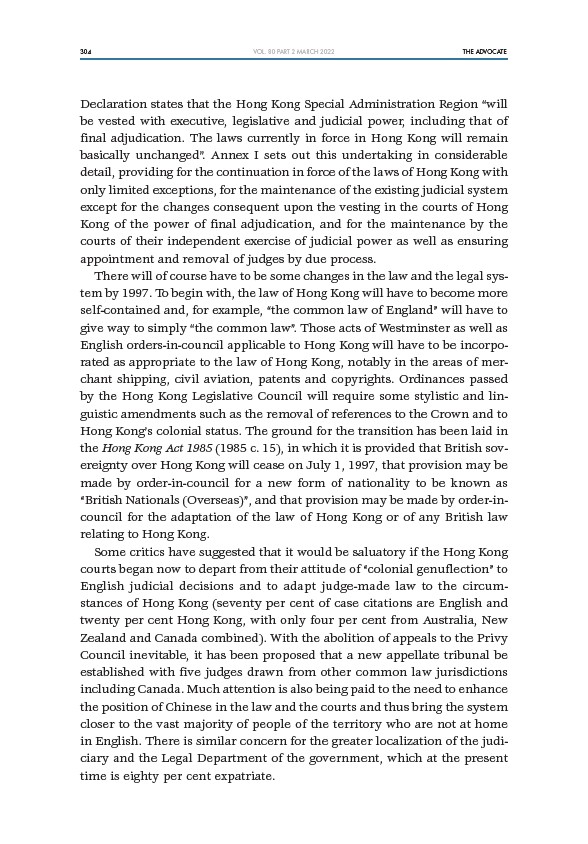
304 THE ADVOCATE
VOL. 80 PART 2 MARCH 2022
Declaration states that the Hong Kong Special Administration Region “will
be vested with executive, legislative and judicial power, including that of
final adjudication. The laws currently in force in Hong Kong will remain
basically unchanged”. Annex I sets out this undertaking in considerable
detail, providing for the continuation in force of the laws of Hong Kong with
only limited exceptions, for the maintenance of the existing judicial system
except for the changes consequent upon the vesting in the courts of Hong
Kong of the power of final adjudication, and for the maintenance by the
courts of their independent exercise of judicial power as well as ensuring
appointment and removal of judges by due process.
There will of course have to be some changes in the law and the legal system
by 1997. To begin with, the law of Hong Kong will have to become more
self-contained and, for example, “the common law of England” will have to
give way to simply “the common law”. Those acts of Westminster as well as
English orders-in-council applicable to Hong Kong will have to be incorporated
as appropriate to the law of Hong Kong, notably in the areas of merchant
shipping, civil aviation, patents and copyrights. Ordinances passed
by the Hong Kong Legislative Council will require some stylistic and linguistic
amendments such as the removal of references to the Crown and to
Hong Kong’s colonial status. The ground for the transition has been laid in
the Hong Kong Act 1985 (1985 c. 15), in which it is provided that British sovereignty
over Hong Kong will cease on July 1, 1997, that provision may be
made by order-in-council for a new form of nationality to be known as
“British Nationals (Overseas)”, and that provision may be made by order-incouncil
for the adaptation of the law of Hong Kong or of any British law
relating to Hong Kong.
Some critics have suggested that it would be saluatory if the Hong Kong
courts began now to depart from their attitude of “colonial genuflection” to
English judicial decisions and to adapt judge-made law to the circumstances
of Hong Kong (seventy per cent of case citations are English and
twenty per cent Hong Kong, with only four per cent from Australia, New
Zealand and Canada combined). With the abolition of appeals to the Privy
Council inevitable, it has been proposed that a new appellate tribunal be
established with five judges drawn from other common law jurisdictions
including Canada. Much attention is also being paid to the need to enhance
the position of Chinese in the law and the courts and thus bring the system
closer to the vast majority of people of the territory who are not at home
in English. There is similar concern for the greater localization of the judiciary
and the Legal Department of the government, which at the present
time is eighty per cent expatriate.